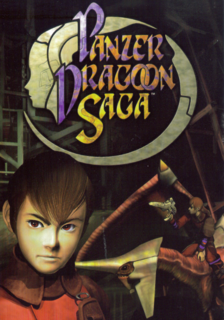Rated M for Mature
The game starts, as its forbearers did, with a FMV. Once again filled with subtleties and elegance, portraying characters not only through voice acting in a strange language (purposefully created for the series), but also through body language and visual imagery, all of which very rare for a 1998 Japanese game. Sadly, the narrative starts off on a somewhat simplistic, clichéd manner, following the story of a boy named Edge, who seeks vengeance against the Empire who had his buddies killed. This was quite bothersome to someone like me, who enjoys plots that suck you in, and almost made me reconsider playing it.
Fortunately, "Saga" pays off on many levels, starting with its wonderful atmosphere. Flying through the game-world on a dragon is, still today, a marvel for the senses, as you delve into a Jean Giraud (aka Möebius) inspired canvas, brimming with alien landscapes and strange magical creatures. In "Saga", you can actually explore these sets without restrictions (in opposition to the rail-shooting nature of previous "Panzers"), which allows you freedom to engulf all the aspects of such an engrossing world, as you listen to Saori Kobayashi's score - a calm, soothing mixture of electronic beats and acoustic sounds. Not all exploration is as grand as the flying of Edge's dragon, I'm afraid. The on-foot exploration is horrid, as it uses the same targeting mechanic as the flying portions, (which becomes rather cumbersome, since it was designed for shooter-driven sequences) and portrays sites with the same graphics engine, which was clearly suited for large, wide open areas, lacking detail and definition in rendering small spaces, like villages and houses, that end up looking ugly and bland.
The nature of combat also evolved, specifically, into a turn based manner, as the player is asked to commandeer the dragon through a series of simple inputs. But before thinking this is another of those slow, boring combat systems that RPG's are known for, let me reassure you, the nature of "Saga's" combat is highly dynamic and entertaining. All because it uses a system where you can, in real time, move your dragon, as you wait for an "Active Time Battle" like bar to fill up. This becomes crucial in employed tactics, as enemies have different attacks according to your spatial position, and different weaknesses as well. This, as well as other elements, adds to a strategic, engaging combat system, that privileges tactic maneuvering and enemy observation over mindless grinding or button smashing.
As soon as the atmosphere and combat were starting to lose interest, the story started twisting and turning, gaining a lot of momentum by fleshing out the wonderful lore that could be felt in its prequels. The final stages of the epic plot have some wonderfully written dialog, presenting morally ambiguous characters with conflicting ideals and philosophies, and revealing interesting interpretations on the human condition. The final sequence, a voyage to a higher plane of existence (in a clear homage to "2001", already present in previous games) is as astonishing as a videogame finale can be, and instantly became one of my favorite endings for a videogame. Because "Saga" is, on many levels, a work of vision, an artistic construction that, to this today, soars highly above its competition in terms of tone and language. When compared to most of Square's "Final Fantasy" titles, that boast their grand epic plots, filled with their silly j-pop characters and outrageous, over the line aesthetics, "Saga" comes out as a subtler, more adult work, that privileges character depth and expression over visual hyperboles. Only when you can discern this, will you understand why such care was given to the game world and the underlying script, through the consistent use of FMV and voice acting for nearly every scene. Though it is a relatively small game (and even there, Team Andromeda seems to have predicted a new, more interesting narrative paradigm), and one that is not without caveats, it remains as one of the finest examples of the genre's potential for story development. It has masterpiece written all over it, you just have to use your mind to see it.

